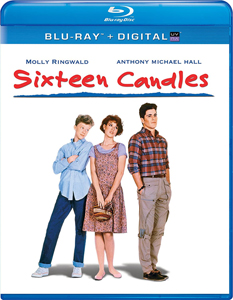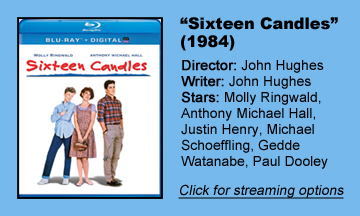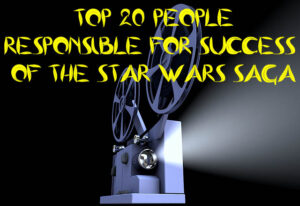Here’s where it all begins: “Sixteen Candles” (1984) marks the start of John Hughes’ reign as a teen-cinema king and it’s the first of Molly Ringwald’s three Hughes films. I’m in the minority in finding it to be an inauspicious beginning.
While Hughes’ directorial debut offers loads of talking points as it establishes tropes and popularizes the genre for a new generation, “Sixteen Candles” is a thin and sometimes even boring movie.
Put-upon heroine
It starts strong with ideal Everygirl Samantha Baker (Ringwald) being put-upon in various ways, namely the fact that her family forgets her 16th birthday as they are distracted by the visiting grandparents and the next day’s wedding of eldest sister Ginny (Blanche Baker).
Sam talks to herself after people have left the room, a precursor to Claire Danes’ “My So-Called Life” voiceovers from a decade later.
I think “Sixteen Candles” is lauded largely for being a rare (at the time) high school film that treats teens’ issues as being worthy of a sober dramatic treatment, rather than something to laugh at from the safe distance of adulthood.
Sam’s issues, though, are not very dramatic even from a skewed teen perspective – which is a problem when seeking entertainment from the film. The sophomore has a crush on senior Jake (Michael Schoeffling), who (she thinks) doesn’t know she exists.
What’s the attraction?
The execution is rough. Jake is two years older than Sam, but Schoeffling is seven years older than Ringwald, and boy is it obvious and distracting. For his part, Jake is bored with his steady girlfriend Caroline (Haviland Morris), and he starts noticing Sam from a distance after finding her classroom note where she acknowledges her attraction to him.
I’m reminded of Oz saying “Who is that girl?” about Willow in “Buffy” Season 2, except that Willow is doing quirky, endearing things. Sam just mopes around. It makes sense that Jake might find his relationship with Caroline to be shallow – it’s based on both of them being popular – but it’s never clear what he sees in Sam.
It’s unfair, but when you’re always down in the dumps and lacking confidence, you don’t tend to draw an obsessive interest from the opposite sex.
On the other hand, “Vacation’s” Anthony Michael Hall is well cast as the freshman – known only as “The Geek” – who unsuccessfully tries to be cool and who is crushing on Sam. Hall is a few months younger than Ringwald, and notably dorkier, so this crush plays honestly on screen.
An outside perspective
Hughes’ biggest stab at over-the-top, raunchy comedy comes through Chinese exchange student Long Duk Dong (Gedde Watanabe). Absurdist chuckles are also gleaned from hearing the grandparents say his name.
Along with comic relief, “The Donger” serves as a foil for the angst-ridden American teens by totally embracing his newfound freedom. He drives recklessly, immediately hooks up with a freakishly tall girl (Debbie Pollack), gets wasted on beer, passes out in the Bakers’ yard, and loves every minute of it.
So Hughes rather cleverly illuminates the ridiculousness of the ennui of Sam, Jake and The Geek while also treating them with compassion.
Indeed, “Sixteen Candles’ ” best moments allow us to feel for and root for Sam, like in the iconic scene where her dad Jim (Paul Dooley) gives her a late-night pep talk on the couch after apologizing for forgetting her birthday.
Rare for a teen story, Jim recognizes that he and Sam haven’t been communicating, and it’s refreshing that Sam finds one person who understands her, even if it is (to her embarrassment) her dad.
Learning the ropes
“Sixteen Candles” is not Hughes’ strongest example of directing or pacing, though. Sam disappears from a good chunk of the narrative, with the focus shifting to The Geek, who drives the drunken Caroline home after a house party that would make the “Animal House” frat members cringe.
Too much time is spent on this awkward B-plot, which launches with Jake encouraging The Geek – who doesn’t know how to drive – to drive his dad’s Rolls-Royce.
While it doesn’t strictly glorify drunken driving, “Sixteen Candles” features reckless driving played for laughs, which makes it tonally weird if we’re supposed to like Jake, The Geek and Long Duk Dong on some level. Jake is especially hard to reconcile: Because the actor looks so mature, I expect more maturity out of him.
The ending is pretty good, though, when Ginny takes four muscle relaxers and her wedding becomes a farce. Hughes treats a teen crush as high drama and a wedding as a joke, and that’s why “Sixteen Candles” is a fascinating and influential text. But stronger examples of casting, pacing and humor will come later in his career.



